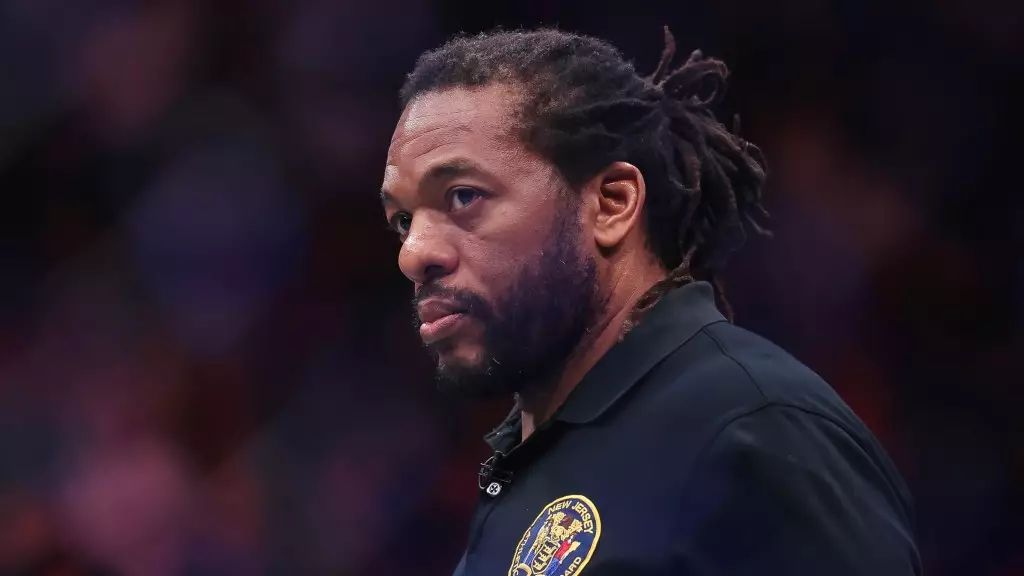In Mixed Martial Arts (MMA), the role of a referee is crucial but often underappreciated. Unlike fighters or coaches, referees usually remain in the shadows, with little chance to explain their actions. Herb Dean, a veteran official in the UFC, has defied this norm by openly discussing his unique perspective and decision-making during matches. His actions during the recent bantamweight title fight between Merab Dvalishvili and Sean O’Malley at UFC 306 have sparked an intense dialogue, not only among fans but also among notable commentators.
On September 14, 2024, the highly anticipated matchup saw Dvalishvili secure a victory over O’Malley. However, what should have been a predominantly sporting event soon became marred by a series of unusual occurrences that provoked criticism directed at Dean. The contest began with an unexpected verbal skirmish between Dvalishvili and O’Malley’s corner—an event that caught Dean’s attention. His decision to intervene and instruct the corner man, Tim Welch, to cease his disruptive commentary prompted a mixed response from spectators, with some claiming he overstepped his boundaries.
Dean’s reasoning behind his decision was clear. He emphasized the necessity of allowing fighters to perform without outside interference, projecting the integrity of the sport. “I’m not here to be anyone’s parent… your job is to coach the fighter, and my job is to do something about it,” he stated in an interview, underlining the boundaries defined in the MMA rulebook. It raises a question, however: should referees actively manage the dynamics of interaction from the sidelines, or should they allow the confrontational nature of the sport to unfold naturally?
Another noteworthy incident during the fight occurred towards the end of Round 2 when Dvalishvili engaged in an act of sportsmanship that bordered on the absurd—he kissed O’Malley’s back multiple times before letting him go. This unusual gesture added yet another layer of complexity to the dynamics unfolding in the Octagon. O’Malley’s reaction, swinging at Dvalishvili in frustration before the round concluded, only exacerbated the situation. Dean intervened once more, this time issuing a warning to the victorious fighter about what constitutes acceptable behavior and sportsmanship inside the cage.
Dean defended this intervention by articulating the importance of maintaining decorum during the fight. “Yes, yes, and that falls under sportsmanlike conduct. It does,” he reiterated, making clear his commitment to upholding the sport’s standards. This specific moment encapsulates the ongoing struggle between personal expression and adherence to the rules, challenging the fighters to navigate this fine line.
As the fight progressed, Dean continued to assert his presence, urging Dvalishvili to “work” as he began to distance himself from O’Malley. This led to criticism from commentators, particularly Joe Rogan, who questioned the appropriateness of Dean’s remarks. The referee’s approach raises critical questions about the balance of power in the Octagon. Should a referee simply observe rules, or do they have a mandate to encourage fighters to engage more actively?
“I’ve seen on social media people have spoken on me about calling the fighters to do more action,” Dean acknowledged. His philosophy emphasizes the importance of dynamic engagement, suggesting that the referee’s role extends beyond mere oversight to actively facilitating the contest. Yet this raises an essential discourse about autonomy in combat sports; does a referee’s urging encroach upon a fighter’s ability to dictate the pace and rhythm of the fight?
The fallout from UFC 306 has reignited a conversation about the standards for officiating in MMA. Many fans and analysts are now questioning whether the current practices effectively prioritize the fighters’ autonomy and the integrity of competitive fairness. Dean’s willingness to address his methods is commendable, yet his decisions may indicate a shift in how the role of a referee could evolve in the hyper-competitive world of MMA.
Herb Dean’s actions during Dvalishvili vs. O’Malley offered a wealth of material for analysis regarding the roles and responsibilities of referees in MMA. The incident highlights an ongoing struggle between maintaining guidelines and encouraging fighters while raising questions about the complex interaction of combatants within the cage. As MMA grows in popularity, defining these boundaries will be crucial for the sport’s development, maintaining not just its competitive spirit but its respectability as well.

